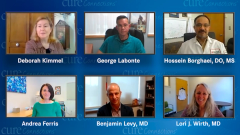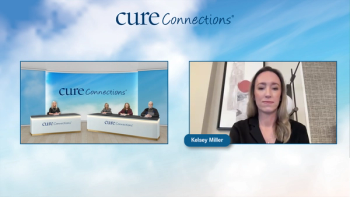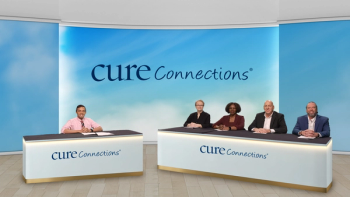
Receiving a Diagnosis of Advanced NSCLC
Deborah Kimmel describes the symptoms that led to a diagnosis of advanced non–small cell lung cancer and explains her journey to connecting with Dr Benjamin Levy and undergoing molecular testing.
Episodes in this series

Hossein Borghaei, DO, MS: Ms. Kimmel, do you mind sharing your story with us from the onset of symptoms until you saw Dr [Benjamin] Levy, and then the whole process of testing?
Deborah Kimmel: First, thank you so much for including patients in this conversation. I’ve enjoyed learning, and I appreciate being able to provide perspective. In May 2017, I was prescribed a drug for osteoporosis, which was a pill taken that requires sitting upright for 30 minutes once taken because one of the side effects is esophageal burning if you lie down too quickly. I started developing a cough.
The heartburn continued to develop, and I continued to have a cough throughout the summer. I’m a sole proprietor consultant, and I was being sent to Charleston, South Carolina, on a military project. So I knew I was going to be gone for a couple of months, and these projects are incredibly intense. I kept having heartburn, which I originally attributed to stress, working hard, not having a chance to “recharge my battery” and get better. I thought maybe I had a dairy issue, so I cut dairy out for a few days. Then I thought it could be a gluten issue, so I cut gluten out. Then I found an internist in Charleston. I went to her and I said, “You’ve got to help me. I can suck it up through the heartburn pain, but I’m not getting any sleep, and that’s killing me at work.” She gave me something that eases the symptoms of my heartburn. It didn’t help; it got worse. I went back to her in October, saying the medication was not working and I need to have something stronger, which she prescribed.
I finished the projects and came home to Washington, DC. I went to a GI [gastrointestinal] specialist—she had suggested if the heartburn didn’t resolve to see a GI specialist. I had an endoscopy; there was nothing abnormal. I went to an ENT [ear, nose, and throat] doctor. I thought maybe something was going on up in here [pointing to her face] that’s impacting the heartburn. He couldn’t find anything wrong. Then I started to not feel good. I canceled stuff, and people who know me know that I never cancel anything. I love to do stuff, but I just didn’t feel good.
I went to my primary internist, whom I hadn’t seen in quite a while, and he was the first person to say, “Let’s do a chest x-ray and see if something is going on.” That was around Christmas. He called me as we were taking my mother-in-law and a couple of her friends out for their Christmas dinner and down to see the Capitol tree. He called me on the phone and said, “I need you to come back tomorrow for a CT scan.” So I said, “When do you want me?” He told me, “You have a mass, and it looks like it could be cancerous.” I’d been blessed with good health my whole life, so the idea of having cancer never crossed my mind. When he said that to me, the first words out of my mouth were, “What else could it be?” He said, “Maybe it’s an infection.” I said, “I’m sure that’s what it is, but I’ll come in tomorrow and do the scan.”
I went in the next day, we did the scan, and he called me again that night and said, “I’m calling a friend of mine who is a top pulmonologist. It’s his day off, but he’s coming in to meet you. I want you to go in and meet with him [at Johns Hopkins Sidney Kimmel Cancer Center].” I met with him, and from that point, everything started to happen really fast. It started to be like drinking out of a fire hose. He saw me, and he said, “We need you to come in for a biopsy. We need you to have a PET [positron emission tomography] scan.” There was a period of tests, appointments, and procedures. I went through them as I was asked to. I had a lot of faith. I had faith in this internist, so I had faith in the pulmonologist. I had looked into the pulmonologist, and he had pretty impressive credentials, so I thought, “He seems like a pretty good guy if I’ve got to go talk to somebody and do something quickly about this.”
I went to him and then started this series of tests. Then I was sent to Dr Levy, who also was very highly recommended. I liked that he was affiliated with Hopkins. I liked that Hopkins was a teaching hospital. I liked that they had a dedicated cancer center because Dr Lerner, who was the pulmonologist, by that point had said to me, “It looks like it’s cancer.” I didn’t get a onetime diagnosis. I got an evolving diagnosis that ended up being ALK-positive stage IV lung cancer. At first I had a suspicious mass, then cancerous mass, then adenocarcinoma, and finally it metastasized into stage IV, and PD-L1, and then biomarker ALK-positive. That happened over four to six weeks.
I sat down with Dr Levy, who was great. I appreciated that he sat down next to me and didn’t just talk to me. He had a piece of paper, so he made some notes and did some diagramming, taking me to the ALK-positive diagnosis. He started me on the targeted therapy, which is appropriate for my diagnosis and was the protocol at the time. That was in early February 2018. Since then I’ve been in 38, 39, almost 40 months of routinely taking this targeted therapy. The only other complication I had that changed this is I did end up with a very painful blood clot in my left calf that required adding a blood thinner to my medications. But I live every day taking this targeted therapy. I’d say that I’m in maintenance mode, working with Dr Levy. Does that answer your question?
Hossein Borghaei, DO, MS: Absolutely. Thank you so much for being so open and sharing your story with us. We really appreciate it.
This transcript has been edited for clarity.


